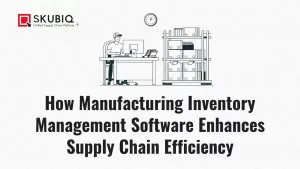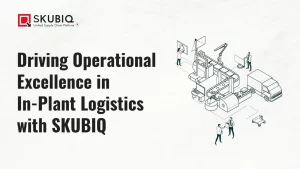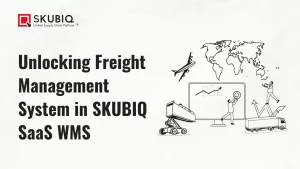In the dynamic world of E-commerce Supply Chain, where consumer demands and market trends fluctuate rapidly, a well-structured and efficient supply chain management system is crucial. This article will delve into the intricacies of supply chain management in ecommerce and explore the key steps involved in ensuring a smooth and effective process.
We will also touch upon the significance of a warehouse management system, the importance of supply chain management KPIs, and the nuances of the order fulfillment process. Additionally, we will examine how the delicate balance of supply and demand plays a pivotal role in the success of an eCommerce business.
1. Sourcing Raw Materials and Manufacturing
The journey of an eCommerce product begins with the sourcing of raw materials and the manufacturing process. Companies need to establish reliable relationships with suppliers to ensure a steady and quality supply of materials. This step is fundamental in maintaining consistency in the products offered to consumers. In the realm of E-commerce Supply Chain, the efficiency of this step directly impacts the ability to meet customer demands promptly.
2. Warehousing and Inventory Management
Once the products are manufactured, they need to be stored in warehouses strategically located for efficient distribution. A robust warehouse management system is essential for organizing and tracking inventory. Utilizing advanced technology, such as RFID systems and automation, can enhance accuracy and speed in managing inventory. The goal is to strike a balance between having enough stock to meet demand and avoiding overstock situations that lead to unnecessary carrying costs.
3. Order Processing and Fulfillment
The order fulfillment process is a critical link in the eCommerce supply chain. It involves receiving customer orders, processing them accurately, and ensuring timely delivery. Technology plays a significant role in this step, with order management systems streamlining the process. Efficient order processing not only enhances customer satisfaction but also contributes to a positive brand image.
4. Distribution and Logistics
Distribution and logistics involve the movement of products from warehouses to distribution centers and, ultimately, to the end consumer. This step requires a well-orchestrated transportation network. Companies often employ various modes of transportation, such as trucks, ships, and planes, depending on the scale of operations and the geographic scope of their market. Real-time tracking and route optimization are integral components of effective distribution.
5. Retailer and Customer Channels
In the context of supply chain management in ecommerce, the relationship with retailers and the end customer is crucial. Companies need to collaborate closely with retailers, ensuring that products reach them on time and in the right quantities. Simultaneously, direct-to-customer channels require streamlined processes for shipping and handling returns. Building strong relationships with both retailers and end consumers is vital for sustainable growth.
6. Returns Management
Returns are an inevitable aspect of eCommerce. An efficient returns management system is essential for maintaining customer satisfaction and minimizing losses. Companies need to establish clear policies and procedures for returns, including the seamless processing of returned items back into inventory. Data analytics can be leveraged to identify trends in returns and address root causes.
7. Supply Chain Management KPIs
Monitoring and assessing the performance of the supply chain is imperative. Key Performance Indicators (supply chain management KPIs) provide valuable insights into the efficiency and effectiveness of various processes. Metrics such as order fulfillment time, inventory turnover, and on-time delivery rates help identify areas for improvement. Regularly analyzing these KPIs allows businesses to make informed decisions and optimize their supply chain.
8. Adaptability and Technology Integration
In the ever-evolving landscape of eCommerce, adaptability is a key factor for success. Companies must stay abreast of technological advancements and integrate relevant innovations into their supply chain processes. Automation, artificial intelligence, and data analytics are powerful tools that can enhance efficiency and agility in responding to market dynamics.
9. Supply and Demand Balancing
The delicate balance between supply and demand is a fundamental aspect of the eCommerce supply chain. Companies must accurately forecast demand, align production and inventory levels accordingly, and have contingency plans in place for unexpected fluctuations. Striking the right balance ensures that products are available when consumers want them, preventing lost sales due to stockouts or excess inventory.
Conclusion
In conclusion, the steps in the supply chain of eCommerce are interconnected and require meticulous planning and execution. A well-optimized E-commerce Supply Chain can significantly contribute to the success and sustainability of an eCommerce business. From sourcing raw materials to managing inventory, processing orders, and balancing supply and demand, each step plays a vital role.
Embracing technology, monitoring KPIs, and prioritizing adaptability are key strategies for navigating the complexities of the ever-evolving eCommerce landscape. By focusing on these aspects, businesses can build a resilient supply chain that meets the demands of today’s dynamic market.
Frequently Asked Questions (FAQs) about E-commerce Supply Chain
E-commerce Supply Chain refers to the end-to-end process of managing the flow of goods, from the sourcing of raw materials to the delivery of finished products to the end consumer. It is crucial for ensuring efficiency, reducing costs, and meeting customer demands in the dynamic world of online retail.
A Warehouse Management System (WMS) is a software application designed to optimize and streamline warehouse operations. It helps E-commerce businesses manage inventory, improve order accuracy, and enhance overall efficiency in storing and retrieving products, ultimately leading to faster order fulfillment and improved customer satisfaction.
Supply Chain Management Key Performance Indicators (KPIs) are measurable values that provide insights into the performance of various aspects of the supply chain. These metrics, such as order fulfillment time and inventory turnover, are essential for businesses to assess their efficiency, identify areas for improvement, and make informed decisions to optimize the supply chain.
Effective order fulfillment in E-commerce involves a streamlined process from order placement to delivery. Utilizing technology, such as order management systems, optimizing warehouse operations, and implementing efficient logistics and distribution strategies, helps companies process orders accurately and ensure timely delivery to customers.
Adaptability is crucial in the E-commerce supply chain due to the rapidly changing nature of consumer demands and market trends. Businesses must stay agile and embrace technological advancements to respond to evolving challenges, seize opportunities, and maintain a competitive edge in the dynamic E-commerce landscape.
Balancing supply and demand in E-commerce involves accurate demand forecasting, strategic inventory management, and the ability to adjust production and distribution levels swiftly. By leveraging data analytics, monitoring market trends, and having contingency plans in place, companies can optimize their supply chain to meet customer demands while minimizing excess inventory or stockouts.



